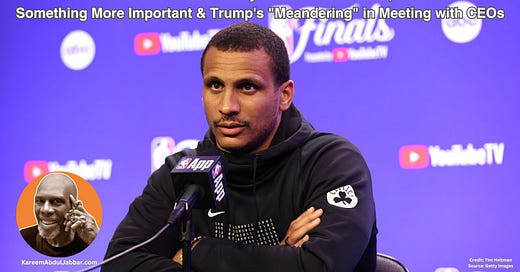Celtics Coach Joe Mazzulla May Win the NBA Finals, But He Lost Something More Important & Trump's "Meandering" in Meeting with CEOs
AI Beauty Pageant Just as Destructive as the Human Ones, NY Gov Bases Public Policy on Customers at Diner, Trump Funnels Campaign Money into His Own Businesses, Adam Bałdych & Leszek Możdżer Play Jazz
What I’m Discussing Today:
Kareem’s Daily Quote: Why we hate losing more than we love winning.
2024 NBA Finals: Celtics coach Joe Mazzulla's unwillingness to discuss race a complicated issue: Mazzulla is a great coach, but he blew a chance to be a great role model. Sadly, he thinks he has.
CEOs at Trump meeting: Ex-president ‘meandering’ and ‘doesn’t know what he’s talking about’: He was preaching to the choir but the choir didn’t understand what he was saying.
Trump’s Campaign Is Funneling Cash Back to His Businesses: A fool and their money are soon parted. That’s especially sad when it’s a fool taking the money.
Trump: Pilots as ‘Beautiful’ as Tom Cruise Told Me UFOs May Exist: Trump only listens to “handsome, perfect” people.
Kareem’s Video Break: Everyone should experience this kind of happiness at least once a day.
How Governor Hochul Decided to Kill Congestion Pricing in New York: This is the kind of political pandering reasoning that no one should accept.
Fake beauty queens charm judges at the Miss AI pageant: The sacred quest to dehumanize women as fantasy objects continues.
Adam Bałdych & Leszek Możdżer Play “Passacaglia”: This fusion of classical and jazz is unlike anything you’ve heard. Unforgettable.
Kareem’s Daily Quote
I hate to lose more than I love to win.
Jimmy Connors, former world No. 1 tennis player for 268 weeks
It would be easy to dismiss Connors’ statement as the sad confession that proves winning doesn’t bring happiness. That conclusion actually misses the point. Sure, super competitive people live in a different stratosphere than most where the air is thin and icy and scratches the throat. Where everything happens both too slowly and too fast at the same time.
Competing is about so much more than winning. For the highly competitive, winning is merely a measure of the success of their will, not a measure of their success as an athlete or as a person. It is a reward, but not necessarily rewarding. That’s because competing is not binary: there’s so much more attached to the game than winning or losing.
Athletes from marginalized groups understand the extra pressure of not losing because they represent their community to change perceptions of bias. Jesse Owens, Jackie Robinson, and Muhammad Ali were among the legions who knew this pressure. Every loss confirms the bigot’s opinion that the group—Black, LGBTQ+, women, Muslim, Jew, etc.—aren’t as good and therefore not deserving of equal rights or respect. They are always battling the endless versions of the Great White/Cis Hope sent to reclaim the rightful racial or gender dominance. In these circumstances, losing feels like you’re letting down an entire people counting on you to prove the bigots wrong. In such cases, winning doesn’t feel like a vindication, just a relief of not losing.
Like most highly competitive people, I approached each game believing we would win. If we did win, that merely confirmed my default setting. But when we lost, the surprise was bitter. None of that is rational, just the mindset necessary to compete at high levels almost every day over three decades.
Losing is a great lesson about living with what you can’t control. Anyone who has played on a team, whether it’s football, basketball, soccer, or pickleball doubles, knows the frustration of being brought down by a teammate’s poor performance. There are games when you feel like you’re strapped in the passenger seat of a car driven by a drunk escaped convict with a death wish. Nothing you do will change the outcome. That’s where the test of character comes in. Pouting, grumbling, throwing the ball, breaking the racquet, or giving your bumbling teammate the death glare tell us that winning is how you receive personal validation that you have worth. Sadly, needing validation by a faceless group is an addiction that can never be satiated.
“Loss aversion” is a psychological and economic concept that explains why people are more sensitive to losing than winning. One theory postulates that losses are felt with twice the impact as gains. This makes us wonder why we are willing to risk feeling bad when losing just for a tepid feeling of victory. It’s like betting someone on the flip of a coin, only you’re putting up $100 and they’re only wagering $50.
In 1999, Maurice Ashley became chess’s first Black American Grandmaster. In his book, Move by Move: Life Lessons On and Off the Chessboard, he devotes an entire chapter to losing: “Sometimes you don’t know what you don’t know. Defeat and losing clarify so much, or have the potential to do so. Embrace it. Don’t try to run away from it.” What he’s saying is that winning confirms what you already know, but losing reveals what you need to know. Like watching Jeopardy! reveals what you don’t know. The elite competitor cherishes that knowledge because it will push them to become better. Winning isn’t the ultimate goal. Better is.





